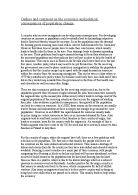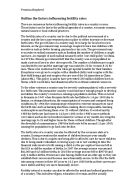Outline and Evaluate Hardin's 'Lifeboat Ethics'.
In 'Lifeboat Ethics', Hardin puts forward an argument against helping the poor. He claims that the nations of the earth may be seen as a series of lifeboats with limited resources. The richer nations are well-managed and self-sufficient, whilst the lifeboats of the poorer countries are overburdened and overcrowded, so many of their people have fallen out and are in the sea around the richer lifeboats begging to be let in or given handouts. However, the lifeboats of the richer nations are limited in resources and do not have space to allow anyone else in. Whilst it may appear just to rescue the poorer people from the water or share wealth with them, this would result in disaster. The 'boat' would sink or the resources would run out, meaning that everyone would drown. Hardin thus argues that his metaphor demonstrates that, overall, it would be disastrous to help the poor; the world's resources would be exhausted and no-one would survive.
However, it can be demonstrated that Hardin's argument fails on several grounds. Not only are many of the assumptions made by Hardin questionably accurate, the lifeboat metaphor itself is too. Hardin fails to represent the situation and the effects of his proposals as they truly are and his argument remains unconvincing. Indeed, by demonstrating his metaphor to be mistaken, it is possible to provide a better representation of the circumstances. From here, a strong case for helping the poor can be given.
Throughout his argument, Hardin draws on his original portrayal of the earth's nations as lifeboats to present a picture of what he terms "the real world". Hardin's major metaphor appears simple but it could be claimed that it is so to the point that it can be considered over-simplistic and unrepresentative. In the "real world", the economies of the world are not separate in the way described by Hardin. Nations have an effect upon each others food supply, population size, economic growth, political systems and more. The effect of rich nations upon poorer ones is undoubtable, and it has not always been beneficial or even well-intentioned.
In 'Lifeboat Ethics', Hardin puts forward an argument against helping the poor. He claims that the nations of the earth may be seen as a series of lifeboats with limited resources. The richer nations are well-managed and self-sufficient, whilst the lifeboats of the poorer countries are overburdened and overcrowded, so many of their people have fallen out and are in the sea around the richer lifeboats begging to be let in or given handouts. However, the lifeboats of the richer nations are limited in resources and do not have space to allow anyone else in. Whilst it may appear just to rescue the poorer people from the water or share wealth with them, this would result in disaster. The 'boat' would sink or the resources would run out, meaning that everyone would drown. Hardin thus argues that his metaphor demonstrates that, overall, it would be disastrous to help the poor; the world's resources would be exhausted and no-one would survive.
However, it can be demonstrated that Hardin's argument fails on several grounds. Not only are many of the assumptions made by Hardin questionably accurate, the lifeboat metaphor itself is too. Hardin fails to represent the situation and the effects of his proposals as they truly are and his argument remains unconvincing. Indeed, by demonstrating his metaphor to be mistaken, it is possible to provide a better representation of the circumstances. From here, a strong case for helping the poor can be given.
Throughout his argument, Hardin draws on his original portrayal of the earth's nations as lifeboats to present a picture of what he terms "the real world". Hardin's major metaphor appears simple but it could be claimed that it is so to the point that it can be considered over-simplistic and unrepresentative. In the "real world", the economies of the world are not separate in the way described by Hardin. Nations have an effect upon each others food supply, population size, economic growth, political systems and more. The effect of rich nations upon poorer ones is undoubtable, and it has not always been beneficial or even well-intentioned.

This is a preview of the whole essay
Teacher Reviews
Here's what a teacher thought of this essay
Overall, a very well written evaluation of Hardin's theory. It makes good points and is consistent in the argument it makes from the start. The final summary of the evaluation is excellent. The only thing that would strengthen this further is the use of examples as evidence. 5 Stars








